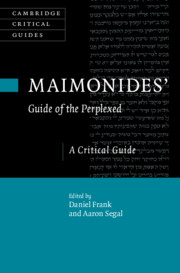Book contents
- Maimonides’ Guide of the Perplexed
- Cambridge Critical Guides
- Maimonides’ Guide of the Perplexed
- Copyright page
- Contents
- Contributors
- Introduction
- Part I Form
- Part II Human Beginnings
- Chapter 3 Paradise and the Fall
- Chapter 4 Maimonides on the Nature of Good and Evil
- Part III The Creator
- Part IV The Created
- Part V Human Finitude
- Part VI Human Ends
- Bibliography
- Index
- Cambridge Critical Guides
Chapter 4 - Maimonides on the Nature of Good and Evil
from Part II - Human Beginnings
Published online by Cambridge University Press: 18 June 2021
- Maimonides’ Guide of the Perplexed
- Cambridge Critical Guides
- Maimonides’ Guide of the Perplexed
- Copyright page
- Contents
- Contributors
- Introduction
- Part I Form
- Part II Human Beginnings
- Chapter 3 Paradise and the Fall
- Chapter 4 Maimonides on the Nature of Good and Evil
- Part III The Creator
- Part IV The Created
- Part V Human Finitude
- Part VI Human Ends
- Bibliography
- Index
- Cambridge Critical Guides
Summary
As is often the case with subjects in the labyrinthine work that is the Guide of the Perplexed, Maimonides’ discussions of the concepts of good and evil are scattered throughout and often interspersed among other topics. In this essay I will endeavor to untangle some of the questions surrounding his treatment of good and evil – or good and bad – specifically as they relate to ethical action. But even limiting oneself to the ethical realm leaves open multiple avenues. Maimonides has much to say concerning virtue ethics, for example, whether with regard to specific virtues, or more generally with his well-known discussion of the Aristotelian doctrine of the mean. Given that our focus here is the Guide, however, where discussion of these issues is more limited than in Mishneh Torah and Shemonah Perakim, and that detailed scholarly work is readily available in these other areas, we will here devote ourselves to a road less traveled but of great significance to the trajectory of the Guide itself.
- Type
- Chapter
- Information
- Maimonides' Guide of the PerplexedA Critical Guide, pp. 60 - 80Publisher: Cambridge University PressPrint publication year: 2021
- 1
- Cited by

